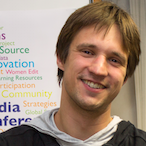CIC is building its team, and we’re delighted to announce the appointment of two new Research Fellows, selected for their human-centred analytics orientation, communication skills and transdisciplinary modes of designing and thinking. Working closely with UTS educators and leaders, Simon and Roberto will help design, deploy, evaluate and theorise next generation analytics tools. These will help both learners and educators see patterns in the data traces left by Learning.Futures student activity.
Check out the focus and style of their work on their websites:
Roberto Martinez-Maldonado, joins us from the University of Sydney. He brings expertise in human-centred computing, educational data mining, surface interfaces, all in the context of analytics for collaborative learning.
I am a postdoctoral research associate in the Centre for Research on Computer Supported Learning and Cognition (CoCo) at the University of Sydney. I did my PhD in the Computer Human Adapated Interaction Research Group at the University of Sydney. My current research project focuses on analysing data generated when groups of students collaborate using shared devices to help teachers to be more aware about their learning processes and take informed decisions. My research grounds on principles of Human-Computer Interaction, Computer-Supported Collaborative Learning, Educational Data Mining and Learning Analytics. In my projects I make use of a number of technologies including multi-touch interactive tabletops, tablets, kinect sensors and databases.
Simon Knight, joins us from the Knowledge Media Institute, Open University UK. He will work on analytics for student writing, information seeking, sensemaking and online discourse.
I’m interested in how people and policies implicate views on ‘knowledge’, through the ways they find and talk about information, and define ‘knowledge’ in documents such as assessment policies. My PhD work uses learning analytics – the analysis of digital trace created during learning tasks – to analyse this issue. My interest is in understanding how people think about information needs, find information, and how we can support them to do that better. As a corollary to that I’m interested in the sort of epistemological implications of search engines, etc. and how that relates to assessment.

